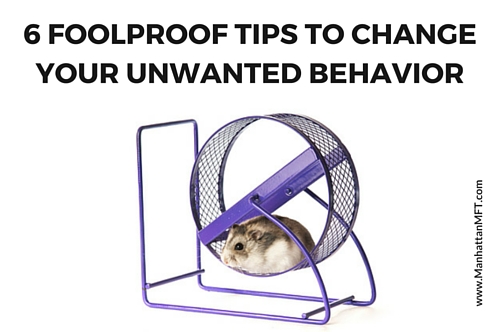These behaviors have a negative impact on the people around us, usually on those we care about the most. Often we know that we should (and usually want to) change our behavior, so that we can remove this negativity, and improve our most important relationships, but we get stuck.
If you have gotten this far you are well ahead of the game and are on the verge of success. You are almost there! Here are some tools to help you actually change your behavior, so you can achieve the desired result. #1. Understand and admit that a behavior is having a negative impact on your life. Behavior change starts with recognition of a behavior that is not working. This might be a behavior that used to serve a positive purpose but now is actually having a negative impact on your well-being. Most often we see this with childhood behaviors that made us feel safe but no longer work for us as adults. Withdrawal behavior is a great example. At one point in your life the behavior was helpful; it kept you out of your parent’s quarrels. Spending time alone in your room made you feel safe. Now whenever you exhibit this behavior your partner complains you are not present or available and you find yourself feeling alone or isolated. #2. Name the specific behavior(s) that is not working. It is not enough to think it quickly. It’s important to really allow yourself to sit in the emotions that come up. Be in the present. Examples include:
#3 Identify the emotion tied to the specific behavior. Once you identify a specific behavior that is no longer serving its purpose, ask yourself what it FEELS like when you are engaged in the behavior. All behavior is tied to or triggered by emotions. The emotions are our signal that we are experiencing something we like or we do not like. And when we feel a certain way we will typically behave to either experience more of that feeling or to try and avoid it. With withdraw behavior the emotion tied to it might be fear. The withdrawal was a reaction to the fear from the discord you felt during your parents’ quarrels, the fear, that your parents would go away. Other withdrawal examples include:
Note that multiple different feelings or emotions can lead to the same behavior (withdrawal), so it is important to understand what is leading to the behavior. #4 Identify where you have felt this feeling before. Our brain automatically stores our emotional experiences. When we have a feeling/experience we have felt/experienced before, we have an automatic emotional response. These automatic emotional responses can come from several places:
It’s important to acknowledge the behavior, but, even more importantly, you must understand its emotional origins. Going back to withdrawal behavior, the fear is a previous reaction to parent quarrels. You can feel this fear even though you do not experience these quarrels in your own relationship. Even when there isn’t a quarrel, you may feel that one could occur and this evokes your need to withdraw. Ultimately the withdrawal serves as a hope that the relationship will remain intact. In this case the withdrawal - fear connection is a family of origin pattern and a learned behavior to keep the pain away. It may also be a pattern of behavior you have learned from previous relationships. #5 Watch out for the pattern Now that you have acknowledged the feeling or emotion and matched it with the output or behavior, observe when it happens. At first you might not realize it is happening until after the episode. That’s ok; you gained awareness after the moment played out. You also noted the feeling that led to the behavior. That is significant progress. Next time you might gain this same awareness the moment it plays out. Or you might watch the behavior happening but feel unable to stop it. That is OK. You are still recognizing what is not working in the moment. #6 Try something different For example, when you feel the fear you might . . . .
There will be times when you revert back to old behaviors. Sometimes the new behavior will work and sometimes it won’t. This gives you information regarding how to try next time you get the feeling of fear. There will be times when you will try new behaviors and win! This is the journey of life. We will always experience the wins and the challenges. Embrace them all! 10/24/2017 07:31:00 am
Unquestionably, change is always wearying. Still one can change his unwelcome behavior and improve his life. If anyone wants to alter his deportment, then first, he needs to find out the probable outsets of his undesired conduct, as well as his inspiration for the change. He should prepare his mind to replace his unwanted behaviors with liking attributes. He should try to make the positive more prominent than negative. From my standpoint, one can change his untoward way of behaving simply by practicing arbitrary acts of self-concern and self-warmheartedness. Comments are closed.
|
Categories
All
Archives
March 2023
|
[email protected]


 RSS Feed
RSS Feed